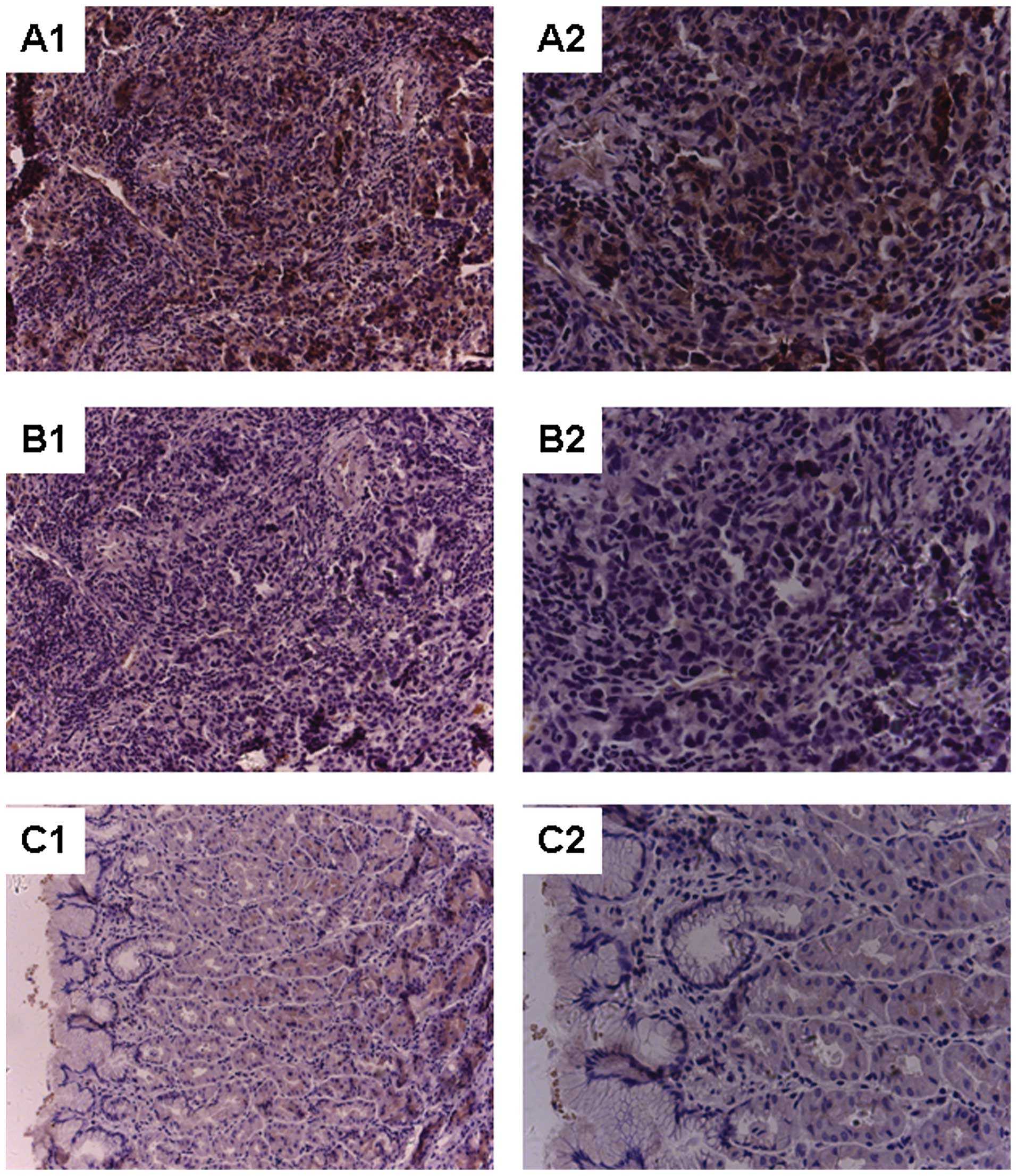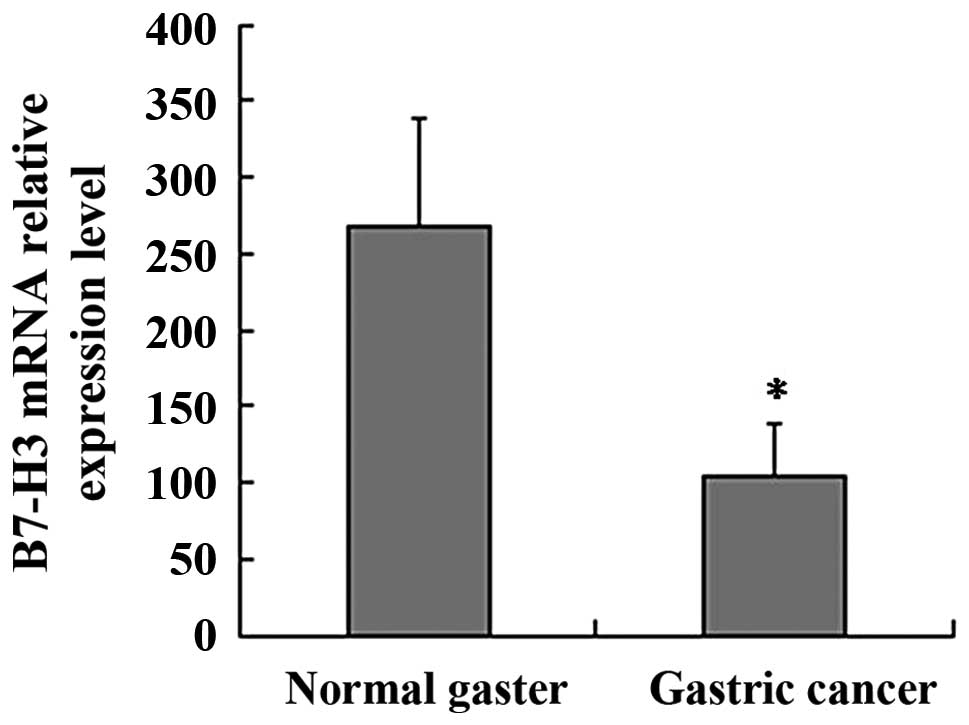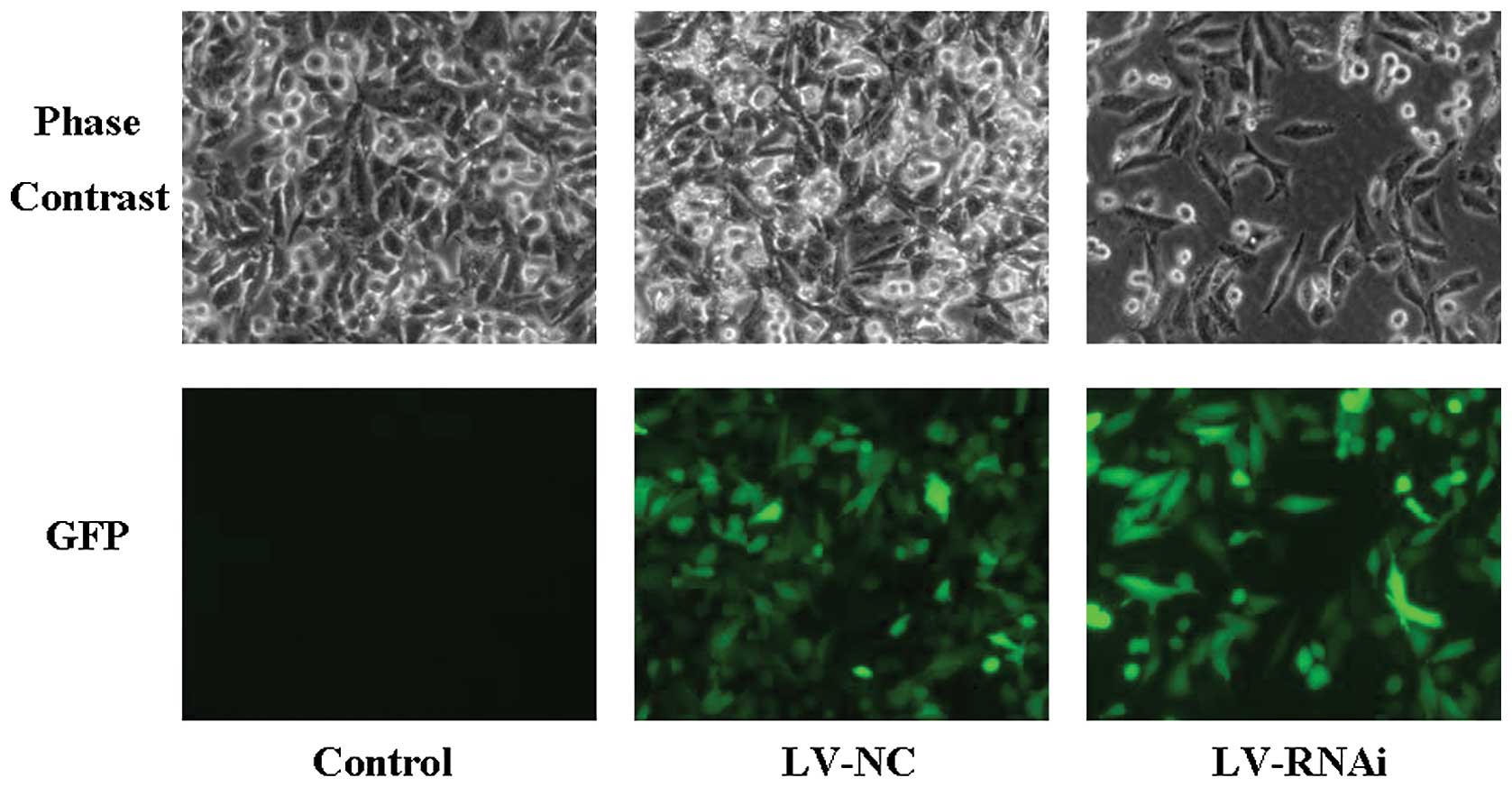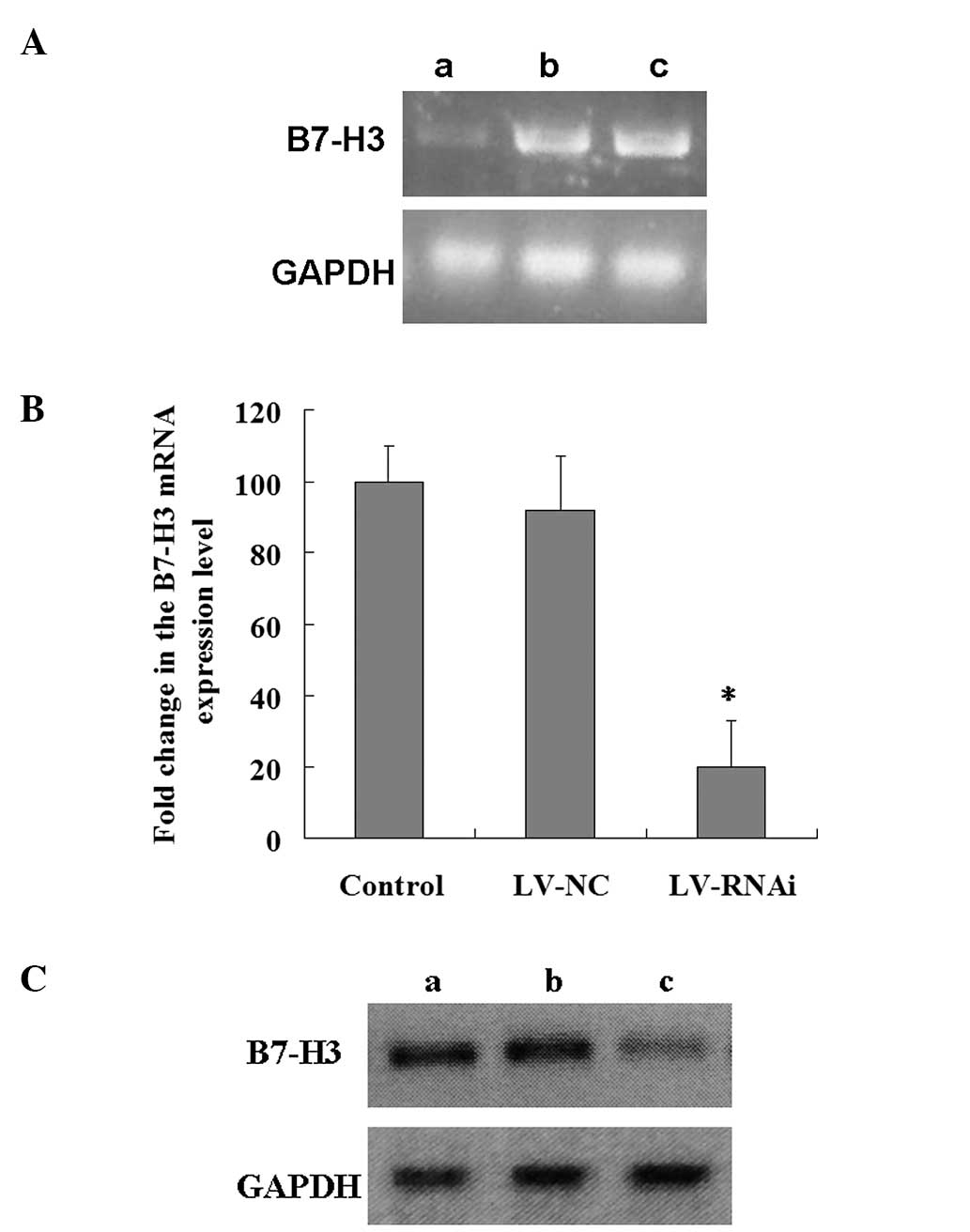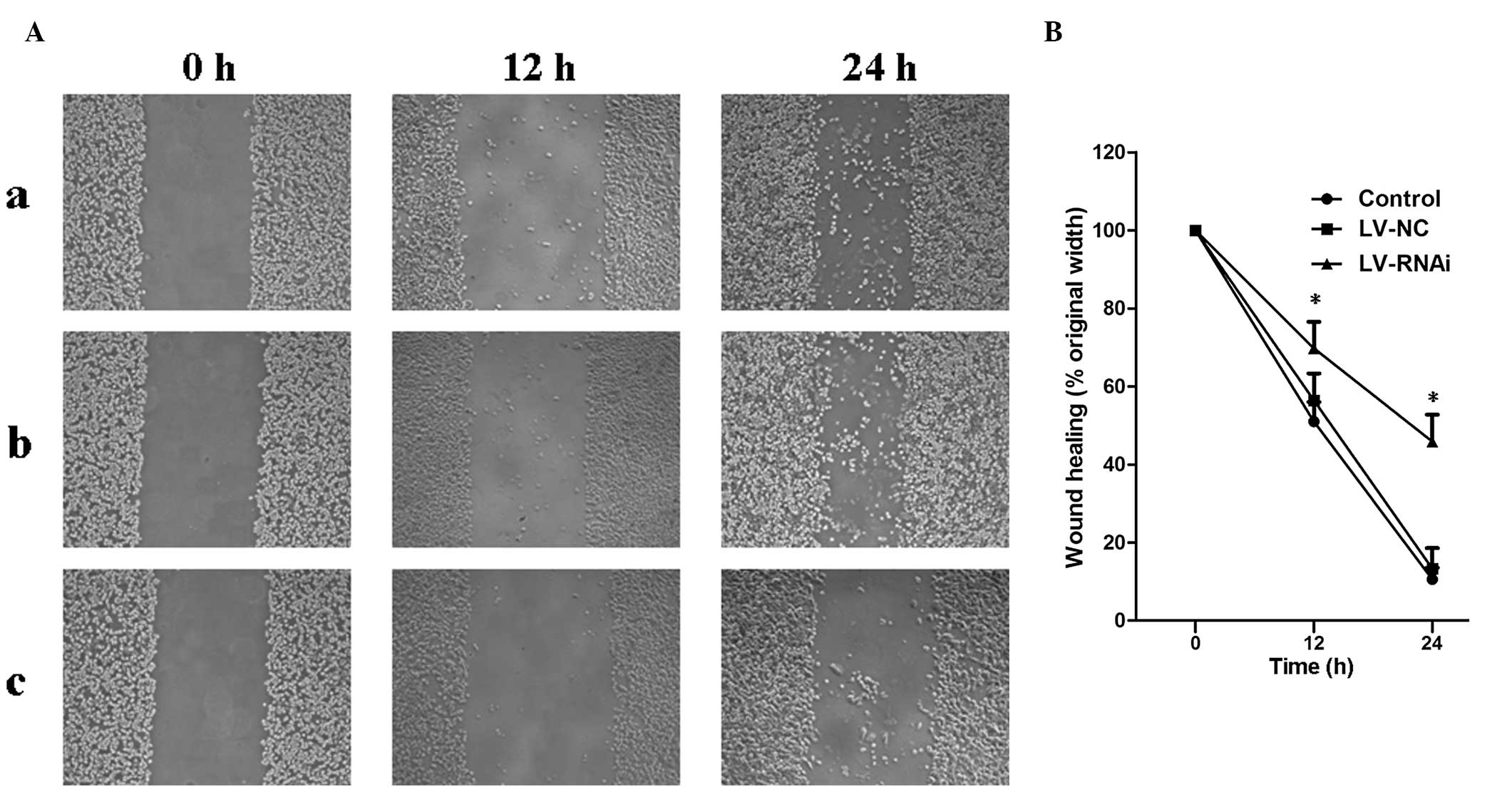|
1
|
Jemal A, Bray F, Center MM, et al: Global
cancer statistics. CA Cancer J Clin. 61:69–90. 2011. View Article : Google Scholar
|
|
2
|
Suh WK, Wang SX, Jheon AH, et al: The
immune regulatory protein B7-H3 promotes osteoblast differentiation
and bone mineralization. Proc Natl Acad Sci USA. 101:12969–12973.
2004. View Article : Google Scholar : PubMed/NCBI
|
|
3
|
Steinberger P, Majdic O, Derdak SV, et al:
Molecular characterization of human 4Ig-B7-H3, a member of the B7
family with four Ig-like domains. J Immunol. 172:2352–2359. 2004.
View Article : Google Scholar : PubMed/NCBI
|
|
4
|
Zhang GB, Zhou H, Chen YJ, et al:
Characterization and application of two novel monoclonal antibodies
against 2IgB7-H3: expression analysis of 2IgB7-H3 on dendritic
cells and tumor cells. Tissue Antigens. 66:83–92. 2005. View Article : Google Scholar : PubMed/NCBI
|
|
5
|
Yamato I, Sho M, Nomi T, et al: Clinical
importance of B7-H3 expression in human pancreatic cancer. Br J
Cancer. 101:1709–1716. 2009. View Article : Google Scholar : PubMed/NCBI
|
|
6
|
Chapoval AI, Ni J, Lau JS, et al: B7-H3: a
costimulatory molecule for T cell activation and IFN-γ production.
Nat Immunol. 2:269–274. 2001.PubMed/NCBI
|
|
7
|
Luo L, Chapoval AI, Flies DB, et al: B7-H3
enhances tumor immunity in vivo by costimulating rapid clonal
expansion of antigen-specific CD8+ cytolytic T cells. J
Immunol. 173:5445–5450. 2004. View Article : Google Scholar : PubMed/NCBI
|
|
8
|
Lupu CM, Eisenbach C, Kuefner MA, et al:
An orthotopic colon cancer model for studying the B7-H3 antitumor
effect in vivo. J Gastrointest Surg. 10:635–645. 2006. View Article : Google Scholar : PubMed/NCBI
|
|
9
|
Castriconi R, Dondero A, Augugliaro R, et
al: Identification of 4Ig-B7-H3 as a neuroblastoma associated
molecule that exerts a protective role from an NK cell-mediated
lysis. Proc Natl Acad Sci USA. 101:12640–12645. 2004. View Article : Google Scholar : PubMed/NCBI
|
|
10
|
Suh WK, Gajewska BU, Okada H, et al: The
B7 family member B7-H3 preferentially down-regulates T helper type
1-mediated immune responses. Nat Immunol. 4:899–906. 2003.
View Article : Google Scholar : PubMed/NCBI
|
|
11
|
Prasad DV, Nguyen T, Li Z, et al: Murine
B7-H3 is a negative regulator of T cells. J Immunol. 173:2500–2506.
2004. View Article : Google Scholar : PubMed/NCBI
|
|
12
|
Fukushima A, Sumi T, Fukuda K, et al:
B7-H3 regulates the development of experimental allergic
conjunctivitis in mice. Immunol Lett. 113:52–57. 2007. View Article : Google Scholar : PubMed/NCBI
|
|
13
|
Ghadially R: The role of stem and
circulating cells in cancer metastasis. J Surg Oncol. 103:555–557.
2011. View Article : Google Scholar : PubMed/NCBI
|
|
14
|
Chaffer CL and Weinberg RA: A perspective
on cancer cell metastasis. Science. 331:1559–1564. 2011. View Article : Google Scholar : PubMed/NCBI
|
|
15
|
Chen YW, Tekle C and Fodstad O: The
immunoregulatory protein human B7-H3 is a tumor-associated antigen
that regulates tumor cell migration and invasion. Curr Cancer Drug
Targets. 8:404–413. 2008. View Article : Google Scholar : PubMed/NCBI
|
|
16
|
Zhang G, Hou J, Shi J, et al: Soluble
CD276 (B7-H3) is released from monocytes, dendritic cells and
activated T cells and is detectable in normal human serum.
Immunology. 123:538–546. 2008. View Article : Google Scholar : PubMed/NCBI
|
|
17
|
Zhao X, Li DC, Zhu XG, et al: B7-H3
overexpression in pancreatic cancer promotes tumor progression. Int
J Mol Med. 31:283–291. 2013.PubMed/NCBI
|
|
18
|
Tsai CY, Lee TS, Kou YR and Wu YL:
Glucosamine inhibits IL-1β-mediated IL-8 production in prostate
cancer cells by MAPK attenuation. J Cell Biochem. 108:489–498.
2009.
|
|
19
|
Fernandez-Martinez AB, Bajo AM,
Sanchez-Chapado M, et al: Vasoactive intestinal peptide behaves as
a pro-metastatic factor in human prostate cancer cells. Prostate.
69:774–786. 2009. View Article : Google Scholar
|
|
20
|
Yaqinuddin A, Qureshi SA, Qazi R, et al:
DNMT1 silencing affects locus specific DNA methylation and
increases prostate cancer derived PC3 cell invasiveness. J Urol.
182:756–761. 2009. View Article : Google Scholar : PubMed/NCBI
|
|
21
|
ElBayoumi TA and Torchilin VP:
Tumor-targeted nanomedicines: enhanced antitumor efficacy in vivo
of doxorubicin-loaded, long-circulating liposomes modified with
cancer-specific monoclonal antibody. Clin Cancer Res. 15:1973–1980.
2009. View Article : Google Scholar
|
|
22
|
Dong H, Zhu G, Tamada K, et al: B7-H1, a
third member of the B7 family, co-stimulates T-cell proliferation
and interleukin-10 secretion. Nat Med. 5:1365–1369. 1999.
View Article : Google Scholar : PubMed/NCBI
|
|
23
|
Wang S, Zhu G, Chapoval AI, et al:
Costimulation of T cells by B7-H2, a B7-like molecule that binds
ICOS. Blood. 96:2808–2813. 2000.PubMed/NCBI
|
|
24
|
Sica GL, Choi IH, Zhu G, et al: B7-H4, a
molecule of the B7 family, negatively regulates T cell immunity.
Immunity. 18:849–861. 2003. View Article : Google Scholar : PubMed/NCBI
|
|
25
|
Tseng SY, Otsuji M, Gorski K, et al:
B7-DC, a new dendritic cell molecule with potent costimulatory
properties for T cells. J Exp Med. 193:839–846. 2001. View Article : Google Scholar : PubMed/NCBI
|
|
26
|
Brandt CS, Baratin M, Yi EC, et al: The B7
family member B7-H6 is a tumor cell ligand for the activating
natural killer cell receptor NKp30 in humans. J Exp Med.
206:1495–1503. 2009. View Article : Google Scholar : PubMed/NCBI
|
|
27
|
Wu CP, Jiang JT, Tan M, et al:
Relationship between co-stimulatory molecule B7-H3 expression and
gastric carcinoma histology and prognosis. World J Gastroenterol.
12:457–459. 2006.PubMed/NCBI
|
|
28
|
Zhang G, Xu Y, Lu X, et al: Diagnosis
value of serum B7-H3 expression in non-small cell lung cancer. Lung
Cancer. 66:245–249. 2009. View Article : Google Scholar : PubMed/NCBI
|
|
29
|
Sun J, Mao Y, Zhang YQ, et al: Clinical
significance of the induction of macrophage differentiation by the
costimulatory molecule B7-H3 in human non-small cell lung cancer.
Oncol Lett. 6:1253–1260. 2013.
|
|
30
|
Qin X, Zhang H, Ye D, et al: B7-H3 is a
new cancer-specific endothelial marker in clear cell renal cell
carcinoma. Onco Targets Ther. 6:1667–1673. 2013. View Article : Google Scholar : PubMed/NCBI
|
|
31
|
Yang QS, Gu JL, Du LQ, et al:
ShRNA-mediated Ku80 gene silencing inhibits cell proliferation and
sensitizes to γ-radiation and mitomycin C-induced apoptosis in
esophageal squamous cell carcinoma lines. J Radiat Res. 49:399–407.
2008.PubMed/NCBI
|
|
32
|
Zhao J, Lei T, Xu C, et al: MicroRNA-187,
down-regulated in clear cell renal cell carcinoma and associated
with lower survival, inhibits cell growth and migration though
targeting B7-H3. Biochem Biophys Res Commun. 438:439–444. 2013.
View Article : Google Scholar : PubMed/NCBI
|















